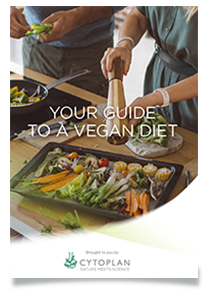Why should I supplement on a vegan diet?
A well-planned vegan diet, with an abundance of vegetables and fruits, beans, legumes and wholegrains can have numerous benefits to health and longevity. But can all the necessary nutrients be obtained on a plant-based diet?
As an initial baseline it is important to ensure that optimum levels of nutrients are obtained, and the nutrition gap is bridged. Here at Cytoplan, we offer a range of vegan multivitamin and mineral formulations designed to bridge the nutrition gap and safeguard against any potential shortfalls.
What are the best vegan vitamins to take?
The following nutrients are important to be mindful of when following a vegan diet and are all included in our multi formulations:
B12 – B12 is important for many functions in the body including nerve health and energy production. Deficiency can cause fatigue, memory problems and contribute to depression. B12 is mainly found in animal foods, and while it can be obtained from fortified foods and seaweed, supplementing B12 is usually a good idea for those on a vegan diet to ensure optimal levels.
Vitamin D – Vitamin D is a common deficiency in the UK due to limited sun exposure and low bioavailability from food. Many products often contain lanolin from sheep’s wool, however, we offer a range of vegan Vitamin D supplements sourced from lichen.
Iodine – Iodine is mainly found in fish and seaweed. A deficiency (and also overload) can lead to issues with the thyroid gland and metabolism. Our multivitamins include iodine sourced from kelp.
Iron – Non-haem iron can be found in foods such as leafy greens, hemp and chia seeds. Iron is not always necessary to supplement and so here at Cytoplan we offer many multivitamin and mineral formulations that differ in the amounts of iron to give those on a vegan diet a choice.
Zinc – Zinc is an antioxidant that is important for immunity, fertility, healthy hormone balance and cognitive function. It can be found in oats, pumpkin seeds and tofu.
What other vegan supplements would you recommend?
We also offer a range of other nutrients to support a vegan diet, which include:
Omega 3 – Our algae supplement contains plant sources of EPA and DHA which have anti-inflammatory properties, maintain cell membranes integrity and support brain health.
Vitamin A – The body can turn carotenoids from plant foods into Vitamin A, however this conversion may not be efficient for some. Vitamin A plays a role in normal vison, immunity and skin health. Our Vitamin A is in the form of retinol palmitate, which is suitable for vegans.
Probiotics – vegan supplements containing live bacteria can help support overall digestive function, immune health and mood.
Collagen – Many collagen supplements are from animal sources. For those wanting to promote the growth and maintenance of their hair, skin and nails, as well as support joint health, our award-winning vegan collagen supplement containing all the needed amino acids is a great option.
Let us help you choose the right vegan supplement
If you are unsure which product is right for you our team of expert nutritional therapists can help. Simply complete our FREE online health questionnaire or email nutrition@cytoplan.co.uk
For further reading, click on the education tab to download our FREE booklet, Guide to a Vegan Diet.
Are your supplements vegan?
Many supplements on the market contain animal by-products such as gelatine, lanolin, fish oils or crustaceans. At Cytoplan a great deal of our supplements are suitable for those on a vegan diet and we always try to create a vegan version of popular products.
What 3 supplements would you recommend to support a vegan diet?
It is firstly important to bridge the nutrition gap with a good quality food based multivitamin and mineral which provides optimal levels of nutrients in the most bioeffective form. Our multivitamins all include B12, iodine and vitamin D.
Secondly, we would recommend a vegan omega 3 supplement due to it’s anti-inflammatory benefits that also help to support cognitive function, cardiovascular, eye and skin health. Flaxseeds are a good source of alpha-linolenic acid, the parent of omega 3, but the conversion to DHA in particular is not always effective.
Thirdly, a probiotic will be beneficial for supporting overall digestive health. In a healthy digestive tract, the microbiome consists of a balanced amount of friendly bacteria that have beneficial effects on health. Factors such as poor diet, stress and medications can lead to issues such as dysbiosis – creating an unbalanced microbiome that can cause symptoms such as bloating, constipation and diarrhoea. A vegan probiotic supplement will support the microbiome, which we know has health benefits beyond the gut.
What foods should I include on a vegan diet?
Protein – Include a variety of protein sources from beans, legumes, nuts and seeds, organic tofu and tempeh. You could also include a plant based vegan protein.
Fruit and vegetables – The base of any great vegan diet is rich in a variety of fruits and vegetables which offer numerous phytonutrients.
Healthy fats – Avocado, extra virgin olive oil, flaxseeds, hempseeds and nuts.
Healthy wholegrains – sweet potatoes, buckwheat, brown rice and quinoa.
Should I take Iron on a vegan diet?
Iron comes from two different forms; haem from animal foods and non-haem from plant foods. The latter may not be as well absorbed by the body because plants also contain substances such as phytates, that bind with the iron to reduce its bioavailability. Iron can be found in many vegan foods such as leafy greens, quinoa, pumpkin seeds, beans and legumes. A tip to increase the absorption of iron, is to pair it with vitamin C foods, and avoid drinking tea or coffee with meals. Iron at high levels, or for those who do not need supplementation (such as those who do not menstruate), can be inflammatory. Therefore, it is important to get iron levels tested before supplementing at higher levels.






































